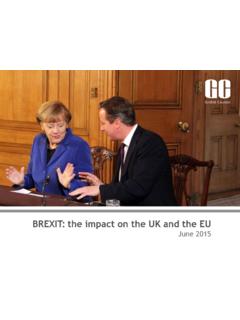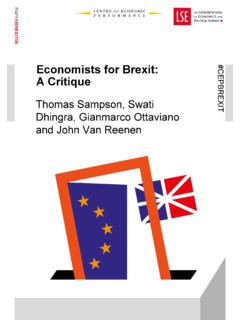Transcription of THE ECONOMIC CONSEQUENCES OF BREXIT: A …
1 OECD ECONOMICPOLICY PAPERA pril 2016 No. 16 THE ECONOMIC CONSEQUENCES OF brexit : A TAXING DECISION Victoria ECONOMIC CONSEQUENCES of brexit : A Taxing Decision This paper has been prepared by: Rafal Kierzenkowski Nigel Pain Elena Rusticelli Sanne Zwart With contributions from: Christine Arriola Dorothee Flaig Jean-Marc Fournier Gabor Fulop Frank Van Tongeren Authorised for publication by Catherine L. Mann, Chief Economist and G20 Finance Deputy The OECD ECONOMIC Policy Paper Series is published on the responsibility of the Secretary-General of the OECD. The opinions expressed and arguments employed herein do not necessarily reflect the official views of the Organisation or of the governments of its member countries. Series: OECD ECONOMIC Policy Papers ISSN 2226583X This document and any map included herein are without prejudice to the status of or sovereignty over any territory, to the delimitation of international frontiers and boundaries and to the name of any territory, city or area.
2 OECD 2016 You can copy, download or print OECD content for your own use, and you can include excerpts from OECD publications, databases and multimedia products in your own documents, presentations, blogs, websites and teaching materials, provided that suitable acknowledgment of OECD as source and copyright owner is given. All requests for public or commercial use and translation rights should be submitted to Requests for permission to photocopy portions of this material for public or commercial use shall be addressed directly to the Copyright Clearance Center (CCC) at or the Centre fran ais d exploitation du droit de copie (CFC) at TABLE OF CONTENTS OECD ECONOMIC POLICY PAPERS, NO. 16 OECD 2016 3 TABLE OF CONTENTS Abstract .. 5 Executive summary .. 6 Introduction .. 8 In the near-term, a series of negative shocks would hit ECONOMIC activity .. 10 Uncertainty has already begun to have a negative impact on the economy.
3 10 Trade would be hit when the UK formally exits the EU .. 14 Quantifying the near-term effects of brexit .. 18 Heightened uncertainty would hit financial conditions and confidence .. 18 A substantial shock to trade would start to feed-through from 2019 .. 19 In the longer-term, supply side shocks would result in considerably greater costs .. 24 Trade would fall further .. 24 Foreign direct investment would decline as the UK becomes a less attractive destination .. 24 Lower immigration would lower labour force growth .. 25 A loss of skills would reduce technical progress .. 28 Further deregulation could have some positive effects .. 29 Quantifying the longer-term effects of 30 Additional reforms in Europe would offer benefits for the UK .. 34 Conclusion: comparison with other 34 Bibliography .. 35 Tables 1. Possible post- brexit arrangements with the European Union .. 16 2. Length of Free Trade Agreement negotiations, examples.
4 17 3. Decomposition of the near -term trade shock .. 20 4. Assumptions for longer term scenarios .. 31 5. Comparison of recent studies on the impact of brexit on the United Kingdom .. 35 Figures 1. Since EU membership in 1973, UK living standards have risen more than in peers .. 9 2. Global ECONOMIC power of the United Kingdom is greater through the European Union .. 9 3. People s voting intentions are neck and neck .. 10 4. brexit risk has begun to affect financial markets in the United Kingdom and the euro area .. 11 5. Uncertainty about brexit has led to capital outflows and a weaker sterling .. 12 6. ECONOMIC policy uncertainty is increasing .. 13 TABLE OF CONTENTS 4 OECD ECONOMIC POLICY PAPERS, NO. 16 OECD 2016 7. brexit generates an important interest in the United Kingdom and beyond .. 14 8. The United Kingdom and the European Union are important trade partners .. 15 9. UK exports of financial services are large.
5 16 10. Corporate bond spreads are correlated with policy uncertainty and equity volatility .. 18 11. Near -term effects of brexit on real GDP in the United Kingdom and the European Union .. 22 12. Financing of the large UK current account deficit requires substantial inflows .. 23 13. The United Kingdom is an attractive destination for foreign direct investment (FDI) .. 24 14. Immigration from the European Union is rising .. 25 15. European Union immigrants are well attached to the job market and have good skills .. 26 16. Immigration is an important driver of employment and GDP growth in the United Kingdom .. 27 17. Immigrant households make a positive net contribution to public finances .. 28 18. Estimated gains to the level of labour productivity from reforms related to managerial quality .. 29 19. Regulation of network industries is low in the UK, leaving little scope for further reductions.
6 30 20. Longer-term effects of brexit on real GDP in the United Kingdom .. 33 21. Longer-term effects of brexit on UK net worth .. 34 Boxes Box 1. Four areas of the new settlement for the United Kingdom in the European Union .. 8 Box 2. Quantification of trade effects when the United Kingdom formally exits the European Union .. 19 Box 3. Calibration of the near-term effects of brexit .. 20 Box 4. Calibration of the longer-term effects of brexit .. 31 Box 5. An illustration of ECONOMIC benefits from continuous EU membership .. 34 THE ECONOMIC CONSEQUENCES OF brexit : A TAXING DECISION OECD ECONOMIC POLICY PAPERS, NO. 16 OECD 2016 5 ABSTRACT/ R SUM The ECONOMIC CONSEQUENCES of brexit : A Taxing Decision Membership of the European Union has contributed to the ECONOMIC prosperity of the United Kingdom. Uncertainty about the outcome of the referendum has already started to weaken growth in the United Kingdom.
7 A UK exit ( brexit ) would be a major negative shock to the UK economy, with ECONOMIC fallout in the rest of the OECD, particularly other European countries. In some respects, brexit would be akin to a tax on GDP, imposing a persistent and rising cost on the economy that would not be incurred if the UK rem ained in the EU. The shock would be transmitted through several channels that would change depending on the time horizon. In the near term, the UK economy would be hit by tighter financial conditions and weaker confidence and, after formal exit from the European Union, higher trade barriers and an early impact of restrictions on labour mobility. By 2020, GDP would be over 3% smaller than otherwise (with continued EU membership), equivalent to a cost per household of GBP 2200 (in today s prices). In the longer term, structural impacts would take hold through the channels of capital, immigration and lower technical progress.
8 In particular, labour productivity would be held back by a drop in foreign direct investment and a smaller pool of skills. The extent of foregone GDP would increase over time. By 2030, in a central scenario GDP would be over 5% lower than otherwise with the cost of brexit equivalent to GBP 3200 per household (in today s prices). The effects would be larger in a more pessimistic scenario and remain negative even in the optimistic scenario. brexit would also hold back GDP in other European economies, particularly in the near term resulting from heightened uncertainty would create about the future of Europe. In contrast, continued UK membership in the European Union and further reforms of the Single Market would enhance living standards on both sides of the Channel. JEL classification codes: C54, E24, E44, H12 Keywords: brexit , European Union, uncertainty, risk premia, confidence, trade, FDI, skills, immigration, deregulation.
9 Les cons quences conomiques du brexit : les co ts d une d cision L adh sion l Union europ enne a contribu la prosp rit conomique du Royaume-Uni. Les incertitudes entourant l issue du referendum ont d j commenc affaiblir la croissance britannique. Une sortie du Royaume-Uni de l UE ( brexit ) conduirait un choc n gatif majeur pour l conomie du pays et aurait des incidences pour tous les membres de l OCDE, en particulier en Europe. Dans une certaine mesure, le brexit quivaudrait un imp t sur le PIB, imposant un co t durable et croissant sur l conomie, qui ne serait pas encouru si Royaume-Uni restait dans l UE. Ce choc serait transmis par le jeu successif de diff rents canaux. Sur le court terme, l conomie britannique serait affect e par le durcissement des conditions financi res et l affaiblissement de la confiance puis, apr s sa sortie officielle de l Union europ enne, par le rel vement des obstacles aux changes et les cons quences pr coces des limitations la mobilit de la main-d uvre.
10 L horizon 2020, le PIB serait plus faible de 3 % qu autrement ( en cas de maintien dans l UE) , quivalent un co t moyen de 2250 GBP par foyer ( en prix actuels). Sur le plus long terme, les effets structurels s affirmeraient par le biais de trois canaux : les capitaux, l immigration et un progr s technique moindre. En particulier, la productivit du travail serait p nalis e par une baisse de l investissement tranger direct et par l acc s un volume de comp tences plus limit . Le manque gagner en termes de PIB se creuserait avec le temps. En 2030, selon le sc nario de r f rence, le PIB serait inf rieur de plus 5 % qu autrement et le montant de l imp t brexit atteindrait alors 3200 GBP par m nage (en prix actuels). Les cons quences seraient encore plus marqu es dans le sc nario le plus d favorable, et resteraient n gatives y compris dans le sc nario favorable.












